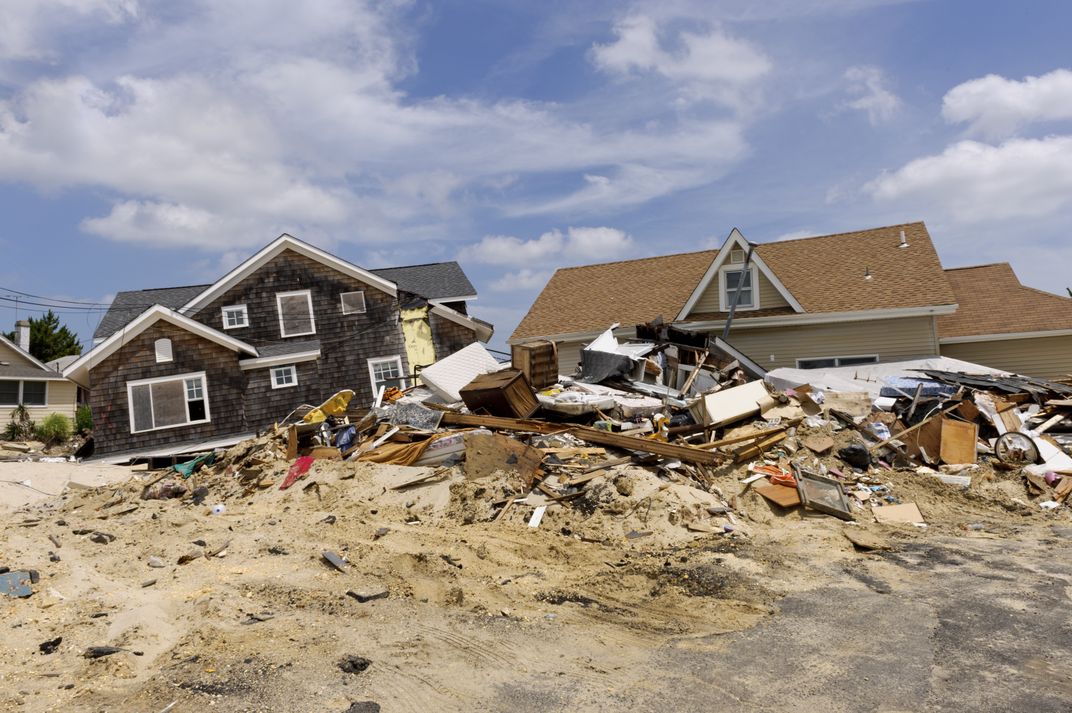Our Gender Biases May Be Making Hurricanes With Female Names More Deadly
Even without Katrina and Audrey, storms with feminine monikers have killed more people than those with masculine names
/https://tf-cmsv2-smithsonianmag-media.s3.amazonaws.com/filer/a5/2a/a52aed56-5e4b-4674-b53e-a469b773ecc9/irene.jpg)
Associating women with weakness may be a misguided, annoying stereotype, but it’s also putting people in danger when hurricanes with feminine names arrive. More people die during hurricanes with female names than male, according to a study published today in the Proceedings of the National Academy of Sciences. And our gender biases are probably to blame, say the scientists behind the findings.
Naming tropical storms and hurricanes is thought to make storm information clearer and easier to recall. (It’s believed to be such a good tactic that the Weather Channel has copied it for winter storms.) Storms aren’t named as they form. Instead, the names are chosen years ahead of time. The third storm of 2018, for example, will be named Chris. Names are recycled every six years and only taken out of the rotation when a storm is particularly deadly or costly—there will never be another Katrina, Ike or Sandy.
Until the late 1970s, storms were only ever named after women. But they now alternate between masculine and feminine names. And that change may have affected how we perceive the risk from those female-named storms.
Kiju Jung of the University of Illinois Urbana-Champaign and colleagues began by examining archival data from the 94 Atlantic hurricanes that made landfall in the United States between 1950 and 2012. There were two outliers in this bunch—Katrina (2005), which killed 1,833, and Audrey (1957), which killed 416—and were not included in the data analysis because their high death tolls skewed results too heavily.

For severe storms, those with feminine names were almost three times as deadly on average as compared with those with masculine names, the scientists found. The pattern held true even if they concentrated only on storms that hit after the naming convention changed. The authors were careful to factor in how risk of storm damage increases as population grows over time.
Then they performed a series of experiments to show how the gender of a named storm affects people’s perception of risk and the actions they would take in response. In one experiment, for example, participants (a roughly even mix of male and female university students) were asked to predict how intense a storm would be based only on its name. People thought storms with masculine names, such as Arthur and Marco, would be more intense than those with names like Bertha and Dolly.
In other experiments, the researchers found that those perceptions influenced decision-making in the face of an oncoming storm. When other volunteers (again, a roughly even mix of men and women) were provided with a fictional storm and a weather map and asked whether they would choose to evacuate the area or stay behind, for instance, they were more likely to evacuate when Christopher was headed their way rather than Christina. And they were more likely to say they’d follow an order telling them to evacuate because Danny was on the way, instead of Kate.
“Although our findings do not definitively establish the processes involved, the phenomenon we identified could be viewed as a hazardous form of implicit sexism,” Jung and colleagues write. “Using human names for hurricanes has been thought by meteorologists to enhance the clarity and recall of storm information,” they note, but “this practice also taps into well-developed and widely held gender stereotypes, with unanticipated and potentially deadly consequences.”
Rather than enhancing communication, it appears that the convention for naming storms may play a role in putting people into danger because of our own inherent biases. It’s difficult enough to convince some people to take appropriate action when a deadly hurricane is headed their way. What the storm is called should not be a further impediment to safety, Jung and colleagues note. They even recommend reexamining the naming convention altogether.
Meteorologists have predicted that this year’s hurricane season, which started yesterday, will be relatively quiet with only nine tropical storms, of which three are expected become hurricanes. But all it takes is one storm passing over your town to cause widespread devastation. So pay attention to meteorologists when one is headed your way—especially if the storm has a woman’s name.
/https://tf-cmsv2-smithsonianmag-media.s3.amazonaws.com/accounts/headshot/Sarah-Zielinski-240.jpg)
/https://tf-cmsv2-smithsonianmag-media.s3.amazonaws.com/accounts/headshot/Sarah-Zielinski-240.jpg)